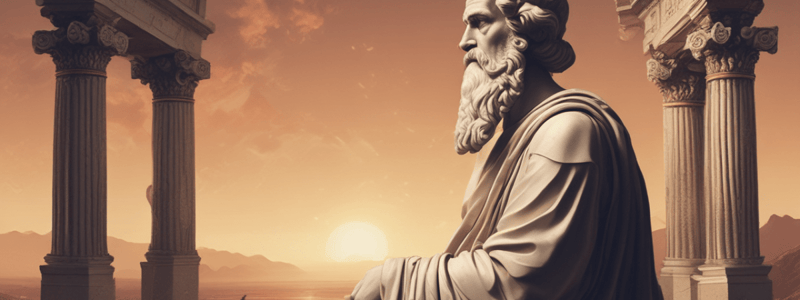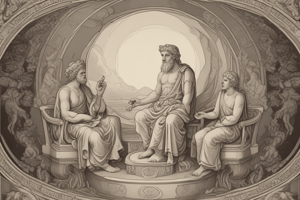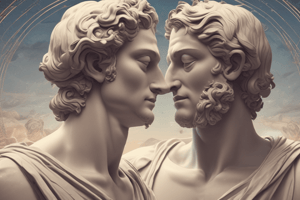Podcast
Questions and Answers
What is the ultimate reality according to Plato's Theory of Ideas?
What is the ultimate reality according to Plato's Theory of Ideas?
- The moral lessons taught by poetry
- Ideas before they take practical shape as things (correct)
- Things as they appear in the physical world
- The emotions that art appeals to
Why does Plato view art as useless?
Why does Plato view art as useless?
- Because it is a reflection of reality
- Because it is only appreciated by the common people
- Because it serves no useful purpose in society and is deceptive (correct)
- Because it is only appreciated by the elite
Why does Plato attack poetry and poets?
Why does Plato attack poetry and poets?
- Because poetry is only appreciated by the common people
- Because poetry is twice removed from reality (correct)
- Because poetry is a reflection of reality
- Because poetry is only appreciated by the elite
What does Plato believe poetry contains?
What does Plato believe poetry contains?
Why does Plato believe poetry affects?
Why does Plato believe poetry affects?
What does Plato believe is the problem with drama?
What does Plato believe is the problem with drama?
Why does Plato believe that drama should be censored?
Why does Plato believe that drama should be censored?
What does Plato believe is the problem with the characters in a play?
What does Plato believe is the problem with the characters in a play?
Why does Plato believe that tragedy and comedy give pleasure to the audience?
Why does Plato believe that tragedy and comedy give pleasure to the audience?
What is the relationship between poetry and philosophy according to Plato?
What is the relationship between poetry and philosophy according to Plato?
What is the primary reason Plato believes art is deceptive?
What is the primary reason Plato believes art is deceptive?
According to Plato, what is the relationship between poetry and the intellect?
According to Plato, what is the relationship between poetry and the intellect?
What is Plato's main concern about the characters in a play?
What is Plato's main concern about the characters in a play?
Why does Plato believe drama is a shame in our normal life?
Why does Plato believe drama is a shame in our normal life?
What is Plato's view on the role of poetry in teaching moral values?
What is Plato's view on the role of poetry in teaching moral values?
Why does Plato believe that poetry cannot take the place of philosophy?
Why does Plato believe that poetry cannot take the place of philosophy?
What is Plato's criticism of poetry in relation to reality?
What is Plato's criticism of poetry in relation to reality?
What is Plato's view on the pleasure derived from tragedy and comedy?
What is Plato's view on the pleasure derived from tragedy and comedy?
Why does Plato believe that drama is a branch of poetry?
Why does Plato believe that drama is a branch of poetry?
What is the main reason Plato criticizes poetry and poets?
What is the main reason Plato criticizes poetry and poets?
Study Notes
Plato's Critical Views on Art and Poetry
- Plato's views on art and poetry are closely tied to his Theory of Ideas, which posits that ideas are the ultimate reality.
- According to Plato, things are conceived as ideas before they take practical shape as things.
Criticism of Art
- Plato views art as useless, as it adds neither knowledge nor intellectual value.
- Art is seen as deceptive and potentially dangerous, sometimes teaching immoral lessons.
Criticism of Poetry
- Poetry is considered twice removed from reality, making men believe in imperfection.
- Poets are inspired suddenly, which cannot be truthful, and poetry fails the test of reason.
- Poetry affects emotions, not reason, and appeals to the heart, not the intellect.
- Emotions are temporary and cannot be safe guides to men.
- Poetry is non-moral in character, treating both virtue and vice alike, and corrupting human beings.
Criticism of Drama
- Drama is a branch of poetry, and its approval and disapproval depend on the audience.
- Dramatists use cheap techniques like quarrels, lamentations, thunder, and sounds of animals to convince the audience, which are shameful in normal life.
- Audience members who watch characters who are cowards, knaves, and criminals tend to become one such character, losing their individuality.
- Such characters should not be present in a play; a play should have good characters.
- Plato is against the pleasure that tragedy and comedy give, as they exploit human emotions like anger, fear, and grief for pleasure.
- In comedy, people laugh at cowardly or criminal characters, who should be pitied, not laughed at.
Plato's Critical Views on Art and Poetry
- Plato's views on art and poetry are closely tied to his Theory of Ideas, which posits that ideas are the ultimate reality.
- According to Plato, things are conceived as ideas before they take practical shape as things.
Criticism of Art
- Plato views art as useless, as it adds neither knowledge nor intellectual value.
- Art is seen as deceptive and potentially dangerous, sometimes teaching immoral lessons.
Criticism of Poetry
- Poetry is considered twice removed from reality, making men believe in imperfection.
- Poets are inspired suddenly, which cannot be truthful, and poetry fails the test of reason.
- Poetry affects emotions, not reason, and appeals to the heart, not the intellect.
- Emotions are temporary and cannot be safe guides to men.
- Poetry is non-moral in character, treating both virtue and vice alike, and corrupting human beings.
Criticism of Drama
- Drama is a branch of poetry, and its approval and disapproval depend on the audience.
- Dramatists use cheap techniques like quarrels, lamentations, thunder, and sounds of animals to convince the audience, which are shameful in normal life.
- Audience members who watch characters who are cowards, knaves, and criminals tend to become one such character, losing their individuality.
- Such characters should not be present in a play; a play should have good characters.
- Plato is against the pleasure that tragedy and comedy give, as they exploit human emotions like anger, fear, and grief for pleasure.
- In comedy, people laugh at cowardly or criminal characters, who should be pitied, not laughed at.
Studying That Suits You
Use AI to generate personalized quizzes and flashcards to suit your learning preferences.
Description
This quiz explores Plato's critical views on art, its role in society, and its relation to his Theory of Ideas, as discussed in The Republic.




